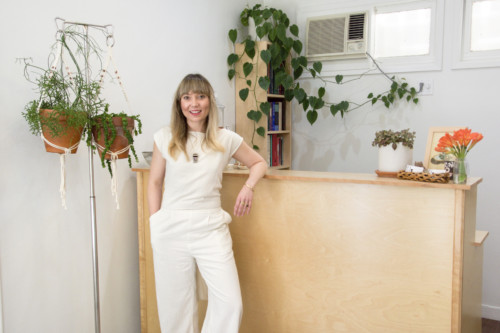
Botanarchy’s Radical Feminist Healthcare Is Exactly What We Need Right Now
“I don’t think there’s a one size fits all approach to medicine,” says Carolyn Barron confidently, as we sip jiaogoulong tea in her sunny, Los Angeles office. Barron is the co-founder of Botanarchy, a radical healthcare clinic whose mission is simply to supply “botanical medicine for body autonomy”. The chic, white jumpsuit that Barron sports in lieu of a white lab coat is an apt metaphor for her disruptive perspective, one that eschews traditional Western medicine in a manner that has become increasingly important as healthcare (especially women’s healthcare) comes under fire.
“I think of this as a feminist model of healthcare– but one that’s open to all genders,” Barron continues. “When I say ‘feminist model,’ I mean it’s separate from that patriarchal, old guard [world] of medicine, where it’s disease-driven, dogma-laden, and kind of shaming– shaming of choice, shaming of autonomy, shaming of lifestyle. It’s a more intuitive approach that’s individualistic and treats the root causes of disease instead of doing symptom management,” she explains. “It focuses on autonomy, choice, and teaching patients how to change their own life and their own health,” she continues. “The idea is that they will go on and pass that on to their family, their community.”
Barron’s radical framework is a thread that runs throughout her practice, even down to the office space itself. Along one wall is a lending library of zines touching on various aspects of herbalism and self-care, some of which Barron brings in, others of which are left by clients. (Anyone is free to take one for themselves.) On the opposite wall, shelves are neatly organized with traditional Chinese herbs sitting alongside more contemporary, “alternative” products like Holy Sponge, a tampon substitute made from sustainably-harvested sea sponges.
“I grew up really deeply entrenched in the Riot Grrrl movement,” Barron reveals. “It informed much of my perspective on body, health, claiming autonomy, and the idea of radical self care– the idea of positing yourself as responsible for your own wellbeing in the world, because no one else is going to give that to you. There’s always been that ethos striking through my practice, even when I was practicing in a student clinic.”
Gesturing to the zines specifically, Barron adds, “People bring me stuff, and then they take stuff… again going to the theme of bringing medicine back into the home and taking things into your own hands. That was one of the ways I started learning my body mastery when I was younger. Hot Pants— which is now this really beautifully-bound book– was a really fundamental part of my healing history. It’s a manual on DIY gynecology. It was published by some women back in the day and it was just a stapled-together zine.”
Yet Barron wasn’t always so holistically-minded. “I was a very jaded and cynical writer, so I was chain smoking while doing yoga,” Barron laughs, referring to her late teens and 20s. But after being sick and experiencing the disempowering framework of Western treatments, Barron began to embrace alternative medicines. “[I] realized a doctor in a white coat is not going to just hand me my health on platter,” Barron reflects. “I rebuilt my life from the ground up in that regard.”
In particular, Barron gravitated towards Chinese medicine– now the foundation of her practice. But, as always, she tempers her approach with other traditions.
“I primarily do traditional Chinese medicine and acupuncture, but I interject it with a lot of Western herbalism. It’s an intuitive approach,” Barron clarifies. “I put together a treatment protocol for the patient with herbs, nutrition, and supplements, and order lab work if I feel that’s necessary. I straddle a lot of different worlds. A lot of practitioners think these two worlds [Eastern and Western medicine] don’t have anything to do with each other– but they have everything to do with each other.”
Barron credits that crossover to much of her success.
“The second I stopped trying to fit in to the white coat model, I started being myself around patients.”
“That’s been a reoccurring theme since I went into medicine: do I chop off parts of my personality and my nature to fit into a model that’s more heteronormative and acceptable for people to trust me? Especially being a doctor. People want to think you have their best interests and the interests of the Western medical establishment at heart. I always struggled with: ‘Do I out myself? Do I do this? Do I do that?’ But the second I stopped trying to fit in to the white coat model, I started being myself around patients. It was this huge shift in my practice… Incorporating ritual and some of the more esoteric practices of traditional medicine and herbalism into my practice has actually been an asset, as opposed to a hindrance.”
With her artfully-blended approach, Barron sees her work as filling a dire deficit in healthcare, one exacerbated by the current legislation around insurance coverage.
“I think it’s more and more important as people feel disempowered, and disenfranchised, and sicker and sicker– to have a type of medicine that’s quick,” Barron says of herbalism and acupuncture. “Patients can walk out of their doctor’s office feeling like, ‘Wow– I’m already changing.'”
To learn more about Botanarchy or to book an appointment, visit the clinic’s website.









































